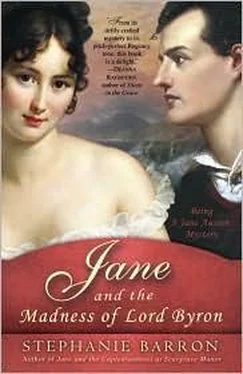“Was it not brave of him?” she suggested in her habitually ardent tone. “But in truth, I believe he would brave anything when the desire to see me overtakes him. Tho’ he professes to hate my very existence, he cannot quite live without me, you know—he is continually answering my letters, and stealing away to see me, under the very nose of my repulsive mother-in-law, Lady Melbourne. I believe it is the challenge he enjoys, as well as the delicious deceit.”
I reflected that her ladyship understood the motives of her erstwhile lover very well; and decided to ignore, for the moment, Byron’s intentions on that evening. Of greater import were his actions , and the approximate times at which they had taken place.
“At what hour did his lordship put in an appearance?” I asked.
Lady Caroline shrugged. “I could not possibly tell you the time. Time is mutable; it expands or contracts depending on the degree of boredom one suffers; in Byron’s presence, it is precious—and horrifyingly fleet.”
Desdemona sighed. “Give over, Caro, do—this is important. ”
Lady Caroline lifted her shoulders once more. She was still directing her speeches to the French windows.
“You quitted the Assembly at one o’clock in the morning, near as makes no odds,” I said. “Byron left the King’s Arms half an hour later, according to the publican’s assurances, which I myself received. His lordship is supposed to have reached Scrope Davies’s lodgings at a quarter to two—the same time at which Catherine Twining was observed by an undergroom to be crossing the Pavilion grounds alone. In order to credit your explanation, we must believe Mr. Davies to have lied—but recollect the evidence of his servants. Not all of them may be paid off, in a matter of murder.”
“You appear to have a higher regard for a menial’s sense of delicacy than I,” Caro told me, “but even if you will have them all be honest, I see no great difficulty. Recollect you are speaking of a publican’s clock, in stating the moment of Lord Byron’s departure.”
I stared at her in puzzlement an instant, until comprehension dawned. Mr. Tolliver’s clock should never run so true to the hour as the Regent’s great instrument above the stables, which should be calibrated with a precision unequaled anywhere but at Greenwich. Tho’ the King’s Arms clock be wound of necessity each day, it must lose time over the twenty-four hours, and was thus, as was common among publick-house instruments, generally set a quarter-hour ahead , so that guests might not miss their stage-coaches, nor Tolliver his hour of closing. When Lord Byron and Scrope Davies thought themselves to be quitting the Arms at half past one, they were undoubtedly doing so at a quarter past—or thereabouts. Miss Twining, however, had certainly quitted the Pavilion at a quarter to two. Nobody, at the inquest or thereafter, had considered of the customs obtaining among publick-house clocks.
“We have been very stupid,” Desdemona observed.
“I had assumed it to be a habit with you,” Caro replied distantly. “Take the statements of the servants, for example. Undoubtedly they were asked when their master and his guests returned home; and undoubtedly they told the time as they knew it—conceiving of the guest as being proved in the fact of George’s valet. Where George himself might be was none of their concern; it is not their place to know. I think the matter readily explains itself.”
Undoubtedly, we must speak with Scrope Davies, I thought despairingly; there remained his insistence that he had sat up drinking wine with Byron until three. I should have to employ Henry or Lord Swithin—who knew him best—in the task of wringing out the truth. But that was another interview; we were still confronting Lady Caroline.
“What occurred when Byron ascended to your boudoir?”
For the first time, her ladyship quitted the windows. She settled herself on a divan, crossing her legs beneath her and taking up a gentleman’s long clay smoking pipe, in which she proceeded to tamp a bit of tobacco. The Countess and I were forced to endure a tedious interval while Lady Caroline engaged in all the business of lighting this, and encouraging it to exude an acrid blue smoke, which she then deeply inhaled, closing her eyes with bliss as she did so—until the eyelids fluttered open once more, and the huge, light-coloured orbs settled upon me unerringly.
“He came to beg Catherine to hear him, of course—full of abject apology for having spirited her away a few days before; he had attempted much the same sort of interview at the Assembly, of course, but she would not attend. She begged me to save her from his clutches, and being no fool—having not the slightest interest in promoting the affaire —I made a show of hurling myself upon George so that she might reach the door in safety. The little idiot ran straight down the passage and out of the Pavilion, without a word to anybody—and nothing more was known of her until the maid screamed bloody murder, as I understand it, at the King’s Arms the following morning.”
“And Byron?” I asked steadily, tho’ I hated the indifference with which Caro spoke of Catherine’s murder.
She blew a cloud before replying. “He would have followed her, of course, until I observed that a man with his limp and a girl of her youth were decidedly ill-assorted. If he could not waltz with me, he should never race with Catherine—she should be safely tucked up in bed by the time he achieved Church Street.”
“Clever Caro,” Desdemona said acidly. “And so he stayed with you?”
“Of course. Once caught in my toils, he never has found the strength to break them. He loves me, you know—in defiance of all he says in publick or private, in defiance of his own reason.” She was suddenly serene as she lay upon the divan, an acolyte at a private altar. “He began by ranting against my passion—by warning me he was unsafe , and that if I could not cut him out of my heart it might end in tragedy for more than myself—but I assured him I had already lost everything of worth to a lady of my station. I am cut dead by my oldest acquaintance, called mad by my own family, and must look on as my husband’s dearest friends urge him to divorce. There is nothing more Byron may strip from me—no further tragedy I may know.”
Lady Oxford had been correct, I realized, when she described Caro Lamb as possessed of a brilliant understanding; it was unfortunate in the extreme that her intelligence had been incapable of subduing the wilder excesses of her emotions.
“And when his raging was done?” Desdemona persisted.
Caro’s eyes closed again. “George was very tired. He has been working quite hard at his verses, you know, and I fear the efforts of Genius exhaust him. He took a little wine. Put his head in my lap, and allowed me to stroke it. And then he began to recite his poem to me— The Giaour . It is quite fine; something quite out of the ordinary way. And to hear the words in George’s voice—” Her own throbbed. “I crave his voice, his touch, his look, as another might the transports of opium.”
I could well believe it; Caro spoke and moved as one still in the grip of phantasm. The man could summon a diabolic power; I had felt it myself. “We talked of the customs of the hareem for at least an hour,” she sighed. “We smoked”—she gestured here with the pipe—“and then he begged me to dress in my page’s clothes, so that he might conceive of his Leila in Turkish dress.”
“And this would have been … perhaps three o’clock?”
“Time, time!” she retorted petulantly. “I told you—when one is in the presence of Byron, time means nothing.”
Читать дальше












